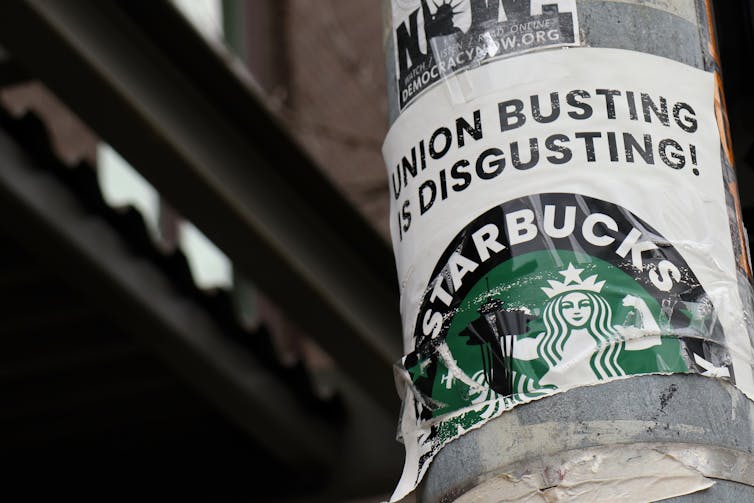
A revised movement on the backs of young workers? Calla Kessler for The Washington Post via Getty Images
America Is in the Middle of a Labor Mobilization Moment – with Self-Organizers at Starbucks, Amazon, Trader Joe’s and Chipotle behind the Union Drive
Public support for unions is at a near 60-year high. Meanwhile, self-organizers at major American chains are spearheading a new movement to mobilize.
Labor Day 2022 came smack bang in the middle of what is increasingly looking like a pivotal year in the history of American unions.
The summer has seen a steady stream of workforce mobilizations. Employees at Trader Joe’s locations in Massachusetts and Minneapolis both voted to unionize. Meanwhile, restaurant chain Chipotle saw the first of its stores unionize, following a vote by workers at an outlet in Lansing, Michigan.
It comes on the back of a wave of successful efforts to mobilize at Starbucks and Amazon. The growth of unionized stores at Starbucks in particular has been stunning. Since baristas in Buffalo, New York, became the first at the chain to unionize in December 2021, colleagues at a further 234 outlets have followed suit in recent months.
Likewise, the success of an independent Amazon Labor Union – formed in 2020 by Chris Smalls, an Amazon worker fired for protesting what he saw as inadequate COVID-19 safety precautions – in forming the first plant of the retail giant to have a unionized workforce has inspired others to do likewise.
It comes as polling shows that public support of unions is at its highest since 1965, with the backing of 71% of Americans. Something is definitely happening in the labor movement in 2022.
A different kind of organizing
As a scholar of the labor movement who has observed union drives for two decades, what I find almost as striking as the victories is the unconventional nature of the organizing campaigns.
Workers at Amazon and Trader Joe’s are setting up independent unions, whereas at Starbucks and Chipotle, employees are teaming up with established unions. But that difference apart, the dynamics at play are remarkably similar: The campaigns are being led by determined young workers. For the most part, it is bottom-up unionizing, rather than being driven by official, seasoned union representatives.
Inspired by pro-union sentiment in political movements, such as Bernie Sanders’ presidential bids, Black Lives Matter and the Democratic Socialists of America, individuals are spearheading the efforts for workplace reform rather than professional union organizers. Indeed, one would be hard-pressed to find many experienced organizers among the recent successful campaigns.
Instead, the campaigns have involved a significant degree of “self-organization” – that is, workers “talking union” to each other in the warehouse and coffee shops and reaching out to colleagues in other shops in the same city and across the nation. This marks a sea change from the way the labor movement has traditionally operated, which has tended to be more centralized and led by seasoned union officials.
A labor revival
Perhaps more important than the victories at Starbucks, Amazon, Trader Joe’s and Chipotle themselves is their potential for creating a sense of optimism and enthusiasm around union organizing, especially among younger workers.
The elections follow years of union decline in the U.S., both in terms of membership and influence.
Prior to the COVID-19 pandemic, these recent labor wins would probably have seemed unimaginable. Powerful, wealthy corporations like Amazon and Starbucks appeared invincible then, at least in the context of National Labor Relations Board rules, which are stacked heavily against pro-union workers. Under NLRB rules, employers can – and do – force workers, on the threat of dismissal, to attend anti-union sessions, often led by highly paid external consultants.
Starbucks has said it has been “consistent in denying any claims of anti-union activity. They are categorically false.” But the NLRB has alleged that the coffee chain has fired and coerced workers, placed union supporters under surveillance and retaliated against them.
The NLRB has also filed a complaint against Starbucks for unlawfully withholding wage and benefit increases from pro-union workers, and currently has almost 300 open unfair labor practices charges lodged against Starbucks management. Amazon, which in the past has advertised for analysts to monitor “labor organizing threats,” has said it respects workers’ rights to join or not join unions.
The significance of the recent victories is not primarily about the 8,000 new union members at Amazon or a gradual flow of new union members at Starbucks. It is about instilling in workers the belief that if pro-union workers can win at Amazon and Starbucks, they can win anywhere.
Historic precedents show that labor mobilization can be infectious.
In 1936 and 1937, workers at the Flint plant of General Motors brought the powerful automaker to its knees in a sit-down strike that quickly inspired similar action elsewhere. In the reported words of a Chicago doctor, when explaining a subsequent sit-down strike by wet nurses in the city: “It’s just one of those funny things. They want to strike because everyone else is doing it.”
Seizing the moment
The pandemic has created an opportunity for unions.
After working on the front lines for over two years, many essential workers such as those at Amazon and Trader Joe’s believe they have not been adequately rewarded for their service during the pandemic and have not been treated with respect by their employers.
This appears to have helped spur the popularity of smaller, workplace-specific unions.
The homegrown nature of these campaigns deprives chains of employing a decades-old trope at the heart of corporate anti-union campaigns: that a union is an external “third party” that doesn’t understand or care about the concerns of employees and is more interested in collecting dues.

But those arguments mostly ring hollow when the people doing the unionizing are colleagues they work alongside day in and day out.
It has the effect of nullifying that central argument of anti-union campaigns despite the many millions of dollars that companies often pumped into them.
An unfavorable legal landscape
This “self-organization” is consistent with what was envisioned by the authors of the 1935 Wagner Act, the statute that provides the foundation of today’s union representation procedures.
The National Labor Relations Board’s first chair, J. Warren Madden, understood that self-organization could be fatally undermined if corporations were allowed to engage in anti-union pressure tactics:
“Upon this fundamental principle – that an employer shall keep his hands off the self-organization of employees – the entire structure of the act rests,” he wrote.“ Any compromise or weakening of that principle strikes at the root of the law.”
Over the past half century, anti-union corporations and their consultants and law firms – assisted by Republican-controlled NLRBs and right-wing judges – have undermined that process of worker self-organization by enabling union elections to become employer-dominated.
But for the long-term decline in union membership to be reversed, I believe pro-union workers will need stronger protections. Labor law reform is essential if the almost 50% of nonunion American workers who say they want union representation are to have any chance of getting it.
Dispelling fear, futility and apathy
Lack of popular interest has long been an obstacle to labor law reform.
Meaningful labor law reform is unlikely to happen unless people are engaged with the issues, understand them and believe they have a stake in the outcome.
But media interest in the campaigns at Starbucks and Amazon suggests the American public may finally be paying attention.
It isn’t known where this latest labor movement – or moment – will lead. It could evaporate or it may just spark a wave of organizing across the low-wage service sector, stimulating a national debate over workers’ rights in the process.
The biggest weapons that anti-union corporations have in suppressing labor momentum are the fear of retaliation and a sense that unionization is futile. The recent successes show unionizing no longer seems so frightening or so futile.
This is an updated version of an article originally published on April 4, 2022.
![]()
This article is republished from The Conversation under a Creative Commons license. Read the original article.






